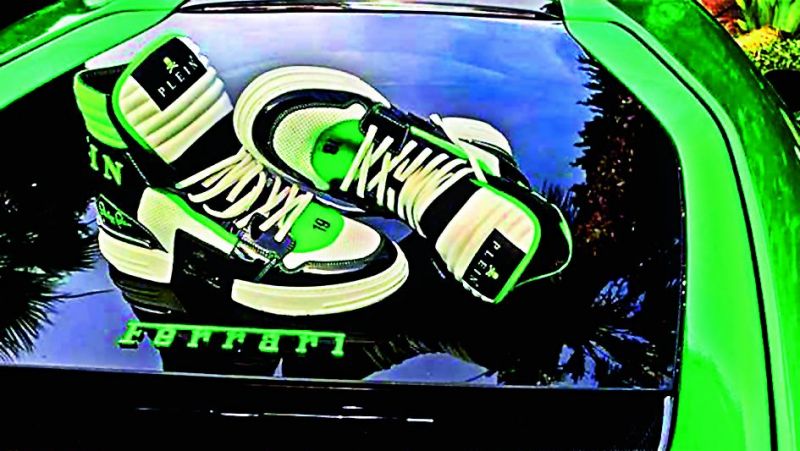The Ferrari drama
Italian luxury car manufacturer Ferrari has threatened to sue German fashion designer Philipp Plein for tarnishing their reputation.

Why do we spend money? To buy products as we like? Ownership lets us use all those goods as we wish. Luxury products, on purchase, while giving its owner an out-of-the-world exhilaration of owning a super expensive item, boost the brand name too. So, who holds the rightful ownership — the brand or buyer? What triggers the question is an incident involving Ferrari and a fashion designer.
The Italian luxury car manufacturer recently threatened to sue German fashion designer Philipp Plein after he posted images and videos of his sneakers placed on the hood of his personal supercar, claiming that his behaviour has tarnished the reputation of the brand and caused Ferrari further material damage. To escalate the matters further, a law firm representing Ferrari termed the pictures distasteful and incompatible to the brand image and dispatched a letter demanding Plein to take the pictures down from his Instagram handle within 48 hours. The designer, in his defense, has called the letter a ‘blackmail’ and posted on his Instagram handle that the car is his property as he bought it with his own money.
 Italian luxury car manufacturer Ferrari has threatened to sue German fashion designer Philipp Plein for tarnishing their reputation after his Insta account showed images of his sneakers placed on the hood of his personal supercar.
Italian luxury car manufacturer Ferrari has threatened to sue German fashion designer Philipp Plein for tarnishing their reputation after his Insta account showed images of his sneakers placed on the hood of his personal supercar.
Who is the rightful owner of a product? In this case, does it belittle the image of an auto giant like Ferrari when it sues its customer for using the product they sold according to his wish? Is there a provision wherein a company can dictate the customer on the usage of the product? We check with celebrities, lawyers, and consumers.
Not to destroy its aura: Ishta Saxena, Advocate
The wide concept of Intellectual Property Rights reserves the right to respect the brand name. The provisions Trademarks Act, 1999, provide the company the right to sue their client for the same. The fact that Ferrari is one of the brands that falls under luxury product made such snapshots get branded as bad and worse. It is probably the way of showing swag on social media, but I think when you own such a class item, which is a dream for rest of the world, one should maintain the dignity and not destroy its aura.
Once bought, product is yours: Anitha Thomas, businesswoman, actor
In my opinion, once you purchase a good, it’s yours. You can choose between what you want to do with it and how you want to keep it. It no longer belongs to the company. You have paid for it and it’s yours. You have the freedom to do as you want. In this particular instance, the Ferrari and the sneakers belong to Philip Plein. Whether he keeps his shoes inside or on top of the car is his choice. Just because it is a Ferrari, can you stop a bird from bombing on it? For that matter, can Ferrari dictate who can ride in a car that you own? No! I do not believe that the company has any grounds for legal action in this case. The charges will be dismissed by the judge as frivolous.
Screen prospective buyers: Jaideep Misra, F&B consultant
Does the status of an average consumer define the brand value of a product, or is it vice versa? If this is what is in store, luxury car manufacturers should start screening every prospective customer before the sale is made. I would like to see a world where people would willingly buy a Ferrari knowing that they could potentially be sued for posting a photograph with it. What does a lawsuit like this mean for car enthusiasts worldwide, and for those who would be considering buying a Ferrari? This might be a first-of-its-kind reclamation of brand identity, that too, by none other than the second best car manufacturer in the world!
I spend according to my choice: Harshika Poonacha, actor
If I purchase a product — luxury good or a basic essential product, then I have the right to use it and display it in whatever way I want. It’s very simple. If I purchase toothpaste, I can use it however I want. After it gets over, I can use it to create art or store something in it; that’s my choice. The way I display it too is my choice even if as an image in my public profile on social media.
Ferrari filing a law suit on Plein is very bizarre. For me, the way I use a product depends on the brand and product. For instance, I will take care of a jewellery that costs a bomb. While using it too, I will be very careful, and will not place it inside a shoe, or wear a bangle on my feet as it’s not meant for that.
Still, even if I do so, the choice is mine and the brand has nothing to do with it. The difference would come only when it becomes a promotional or advertising content.

